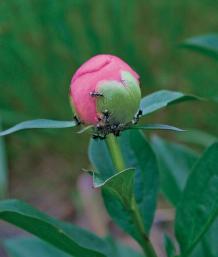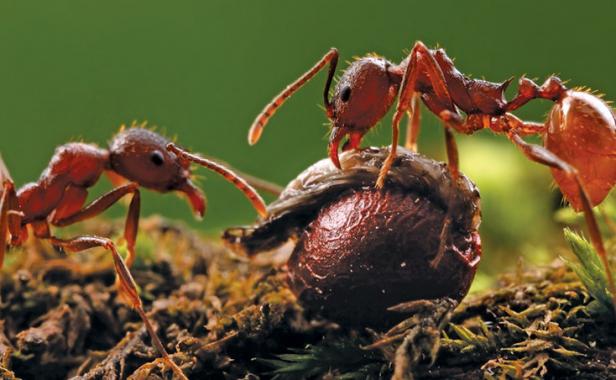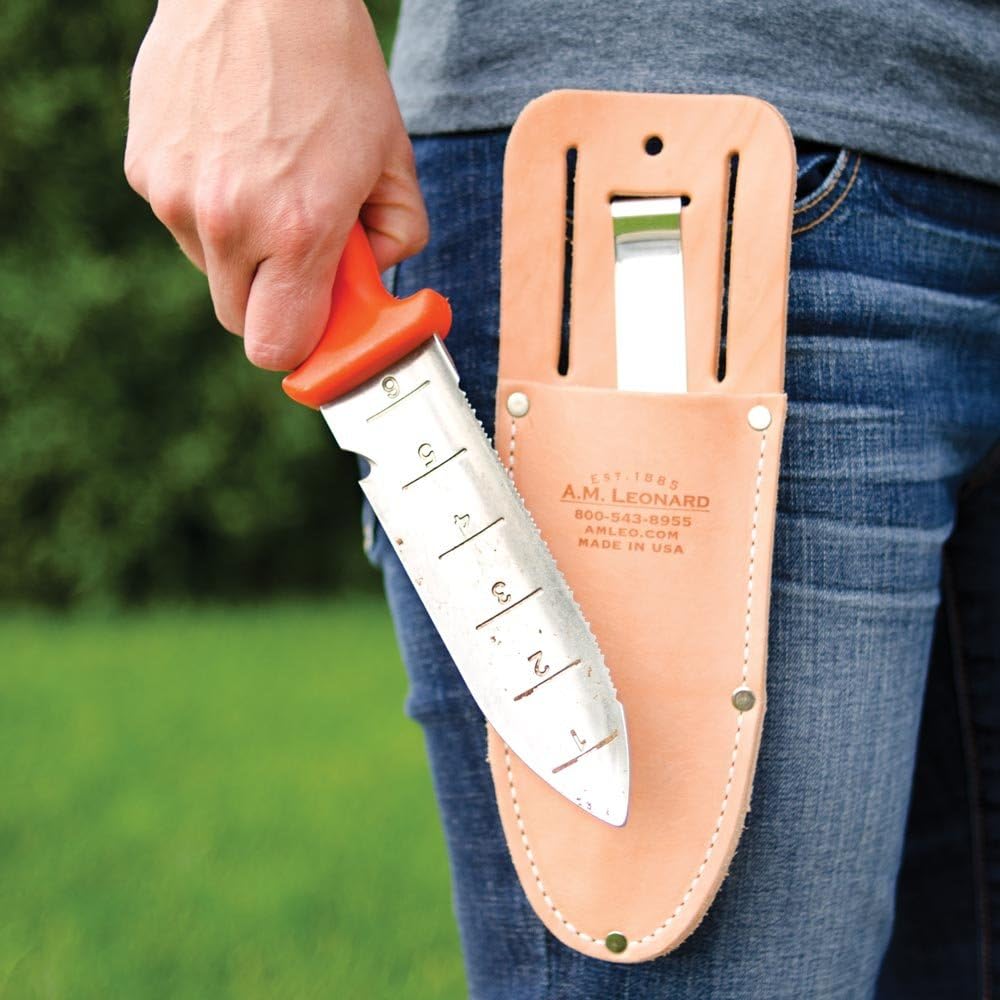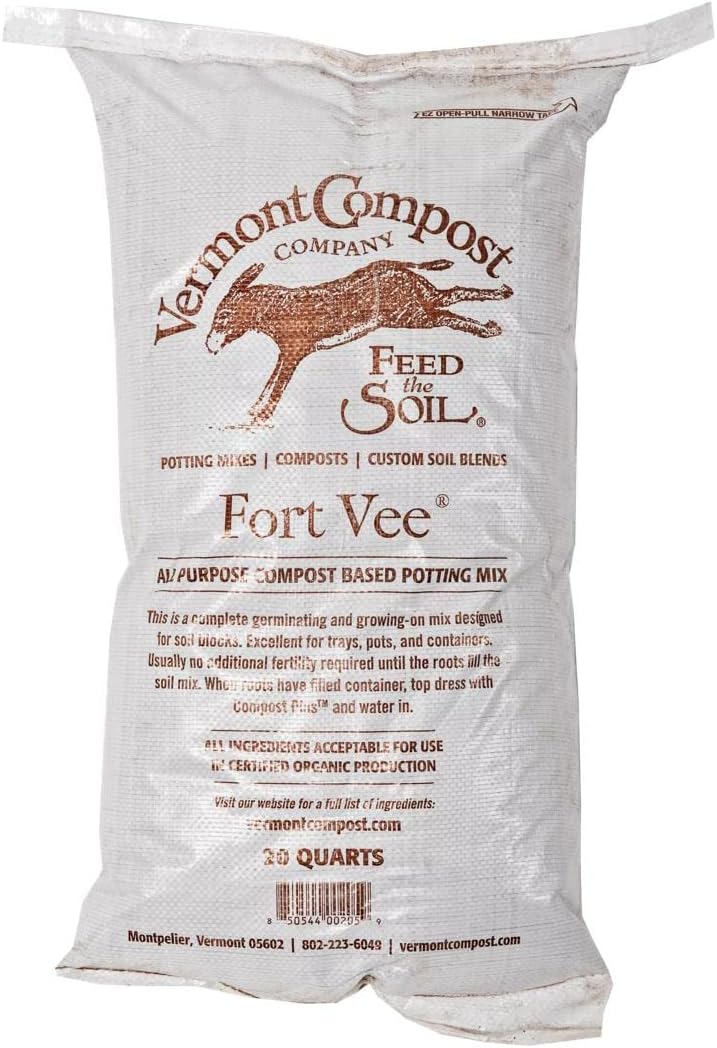

Photo/Illustration: Steve Aitken
When you wander through your lawn or garden and stumble across an anthill, a small mound of soil molded into tiny pellets, it’s often a gardener’s first instinct to destroy it. You stomp and kick until the small hill disappears and the tiny ants scurry off. But by doing so, you’re actually doing a disservice to your garden. Though most gardeners find these anthills a nuisance, they are our first clue to the important, helpful roles ants play in gardens and lawns—they’re tiny rototillers. Tunneling ants turn over as much soil as earthworms do, aerating the soil and redistributing nutrients. Ants are also part of the world recycling crew: acting as scavengers, collecting dead insects and turning them into fertilizer for your soil.
Rather than being seen as pests, ants can be understood as our partners in gardening. One of the most easily observed and important roles that ants play is as seed dispersers. Here in the temperate eastern forests, ants disperse woodland spring wildflowers, such as bleeding heart (Dicentra spectabilis, USDA Hardiness Zones 3–9), trout lilies (Erythronium spp. and cvs., Zones 3–9), and most violets (Viola spp. and cvs., Zones 3–9). They conduct this same role with flowering plants across the country. This enterprise is so beneficial that plants appear to have adjusted the timing of flowering and fruiting to take advantage of high ant activity early in the year.
Smart seeds make ants into accidental gardeners

Ant-dispersed seeds, like those of Dutchman’s breeches (Dicentra cucullaria), have specialist attractants called elaiosomes, or “fat bodies,” that are rich in lipids. Ants collect seeds with elaiosomes, take them back to the nest, feed the elaiosomes to their larvae, and discard the undamaged seed on the nest’s waste heap. The seeds are removed from competition with neighbors, protected from seed predators, and “planted” in the nutrient-rich environment of the ant-waste heap. This process makes a clear argument to keep ants around—if for no other reason than to act as the gardeners of the insect world.
Another advantage of having ants in your garden is protection from herbivores. Ants are attracted to the nectar found on the plant stem or sepals (not the nectar found in flowers that is used by pollinators). The ants patrol these plants and disturb herbivores and seed-eating insects by attacking them, by causing them to fall off the plants, or by interrupting feeding, egg laying, courtship, or molting. The ants crawling all over sticky peony buds in early summer, for example, protect them from enemies, and the ants are rewarded with a rich food source. Some plants also reward this protective role by housing ants in special structures, in addition to providing them with food rich in proteins, lipids, and carbohydrates.
Ant protection from predation is also beneficial for some of our most common insects. The caterpillars of some butterfly groups produce a sweet substance known as honeydew to attract ant protectors. The ants “farm” the caterpillars, sometimes even carrying them into the ant nests to complete development. This interaction can add more butterflies and birds to your garden as they become attracted to the greater insect activity.
A few garden ants are nuisance species. Native fire ants in the South sting and bite, making them unpleasant visitors to the garden. Nonnative red imported fire ants are a more serious problem. They are overabundant because they have escaped their natural competitors and predators in South America. They damage crops, cause a decline in native-ant populations, and even incapacitate machinery. Carpenter ants live in rotting wood but do little damage to live garden plants. Most ants, however, have no negative impact at all.
If you don’t happen to have a pet anteater in your yard, you can control unwanted ants by pouring hot water into their nests, but we discourage it because of all of the important, positive roles that ants play in your garden. The ants, in fact, are eaten by other insects, spiders, frogs, lizards, birds, fish, and some mammals, forming an important part of food webs all over the world.
We are continually learning new ways that ants contribute to the ecosystem. Home gardeners can do worse than follow the biblical advice to observe the ant and be wise.
Fine Gardening Recommended Products

Fine Gardening receives a commission for items purchased through links on this site, including Amazon Associates and other affiliate advertising programs.

A.M. Leonard Deluxe Soil Knife & Leather Sheath Combo
Fine Gardening receives a commission for items purchased through links on this site, including Amazon Associates and other affiliate advertising programs.

Fort Vee - Organic Potting Soil Mix
Fine Gardening receives a commission for items purchased through links on this site, including Amazon Associates and other affiliate advertising programs.


















Comments
NO, ants ARE the enemy, they make nests, they sting, they keep you from safely gardening.. a few ants strolling through, like a large black ant maybe,,, but tiny ants will set up shop and then it is HORRID.. live where there are fire ants or piss ants and you will change your tune. Try checking on a potato hill and a swarm comes out.... try hoeing between rows and dozens start attacking your feet and crawling up your pants leg.. Then there are the battalion of ants protecting aphids on my grapes.... no ANTS are the enemy and with the fire ant they are out of control, They way they are spreading and making their way more north.. more people will have to start to deal with this menace. And I am an organic gardener.. I understand about keeping things in balance. THE ANTS are NOT in balance. I currently have three areas in my small garden that have ants. Problem is,,, you attack them one place and they just move.
and that is just in my garden,,, they are all over the SE... in my yard, my flower beds; sometimes I think that the whole acreage is one giant ant hill with moving entrances. Beware, they are moving north and developing the ability to deal with colder temperatures.
They said fireants are a nuisance species. That's what we have in the SE that sting and bite. Other ants don't unless you bother the nest.
Simply because YOU find them to be a nuisance, does not supersede their benefits to our ecosystem.
There are obvious reasons why there not the enemy..
Once there gone because you keep pushing them aside.. your planet dies!
The queen nests outside.. its not going to re nest in your house.>
Worst damage they will do is go through the air duct to clean up some mountan dew you spilled on the floor.. then writhe in the spot it use to be in for a while and explore around for more.. and possibly never really come back.. unless....
There is a peace of donuts on the ground
If they nest in the house capture the queen and set it someware.. or keep it in a ant farm.. capture all the ants and put it on some foor in a mountan dew bottle..
Its easy... Find the queen place it in a dew bottle with dirt and a screen fused on the cap.. and keep puting food out for bait.
You will soon have 85% of the ants.. culture it outside someware.. it will nest out there and not find your house again..
Your Race destroyed.. Mine would not..
I seperated myself from yours a long time ago for to many reasons..
Instead of building a fenced in area out in the forest with dog houses.. You keep them in cages because it saves your society a dime.. And exterminate them.. Ipretending your running out of room when they can run through fenced off area.. and theres 4x the room.. and there not inside pooping in there cage.. and shoved up in a size about 2X you with you inside as the dog.. Good job.. How you treat a living creature and condone doing nothing about it because your lazy.. Because you don't want to try harder or take responsability.. Like they exist for you and you don't have to do jack for the,..
you spend absurd money to annihilate ants and pretend there a degridation to your property value with a childish Nonsense of a sense of responsibility.. All for the concern of some cash again that is meaningless.. Your property needs to be as valuable as possible even hough your not selling it in the near future.. Geeeenius!!
Your monkeys.. and childish ones at that for 1000's of other reasons just like these.. that you never fix or enlighten yourself beyond.. You just keep on doing so! Your A$$ holes!
A lot of the time.. 85% of the time your race makes an Unenlightened choice! based on man made or Money produced logic! Yeah and it costs so much to have dogs run in a fenced area Vs buying a building and exterminating dogs with gas.. and you dont care.. Shows you for what you really are!
Holy crap. Could you possibly make ANY more spelling mistakes?? Ouch! I'll take the nuisance of ants over your horrendous spelling any day!!
I hear you, I don't mind the little black ants or large brown ants, but the red ones sting hurts so bad, and if I'm stung enough times I get an anaphylaxis reaction. I also cannot allow my little grandson who has asthma to play outside in certain areas.
I've actually had to dig up places and pour boiling water on it like a lake, then bury it back up with chili powder, ashes, sand then more dirt.
Imagine my horror when the corn my little grandson planted was infested. I could not pour boiling water on it. I had to carefully dig up around the roots, add cayenne pepper, then mound up with sand and soak it with water. Later I saw the ants escaping. That was easy,
But one time my little grandson was playing outside with Grandpa around my center garden in the cool of the afternoon when he let out a blood curling scream enough to turn your hair white. He had been bitten by a small red fire ant.
I ran to him and picked him up with tears streaming down his eyes, and they soon were coming down mine.
Those ants have even been brazen enough to come into my home.
I don't use poison because I also believe in saving the eco system, but I will use vinegar with peppermint, chili , or boiling water.
Be tenacious, I've done this so often, they are starting to move out of my yard.
I hear the biggest problem is making sure you get the queen.
It's strange, it's autumn here in the high desert, all the other ants are hibernating, but not the red ants.
Such BS. They can be a benefit to the ecosystem but ants are also an indication that something has gone wrong in your garden, most likely an infestation of sapsucking insects like mealybugs or aphids. The ants are drawn to them (they don't eat the actual insects just the byproducts they leave behind..in doing so they PROTECT those sapsuckers because they want to keep eating!) That is why they're so detrimental to a garden, especially a vegetable garden.
I was looking to find ways to get rid of them, and then I saw this. Saved me a trip to the store! Thank you.
It's quite interesting. Earlier this summer, there was an infestation of leafminer insects on our shard, and we almost lost all our plants to it. At the same time, we were having an ant problem indoors. So, we killed the ants inside, and shortly after, there were ants in the garden. Now, I was thinking these insects were probably doing damage to our vegetables, but upon further investigation, it turned out that they were digging the eggs and larvae out of the leaves. Eventually, the population of leafminers decreased, and the ants leave the garden alone for the most part. So, I think they're pretty helpful.
You have it all wrong. Ants do not eat leaf miners. (I sure wish they would eat mine!) You probably also have mealybugs or sapsucking insects like mealybugs which means the ants are after their byproducts
Fire ants have no natural enemies in Southern America... Except for the phorid fly which had to be introduced and whose population is limited to a few areas.
I live in WA state we have the big red ants too and the whole state is on top of an ant hill, they are everywhere. The red ones have been here as long as I have and I'll be 61 July 1
This article said that ants did not take the same nectar that pollinators eat but in my garden I find dozens of ants every day in zucchini flowers drinking the nectar. Do they pollinate the zucchini? Do they scare away potential pollinators? If someone knows please send me an email- [email protected]
I love these comments. Thanks. <3 Anyhow, my 2 cents is that ants have a habit of getting into my greenhouse and farming scale. Oh yes, as others have said, they love to farm sucking insects so they can partake of the nectar. I'm glad I don't live somewhere where there are fire ants, good luck to all that do. And I'm also glad that I know the difference between Your and You're. ;-)
ANTS ARE NOT BENEFICIAL INSECTS! Every "benefit" described in the article far outweighs their impact on all plants. Ask any Entomologist and they will explain what they do to protect their precious honey dew food sourced. MOST IMPORTANTLY They are an integral part of the spread of the devastating Asian Citrus Psyllid the carriers of the ultimately FATAL disease Huanglogbing (HLB) which is now considered the biggest financially threatening disease in the Worldwide Citrus Industry. Look this up. If you think your citrus is a carrier, report this to your local Agricultural Commisioner or office immediately they will probably want to study your area for quarantine. The other threats to your home garden relates to all pests that create honey dew. Ants will go to great lengths to protect and even help procreate these pests in your garden. These insects include aphids, leaf hoppers, mealy bugs, scale, white flies among others
The highly regarded Fine Gardening publication should include researched articles about HLB and the Asian Citrus Psyllid and its' rapid spread throughout the citrus industry. THIS IS VERY IMPORTANT to every aspect of gardening and agriculture as this disease is ultimately fatal to infected citrus. People need to know about this.....
Log in or create an account to post a comment.
Sign up Log in